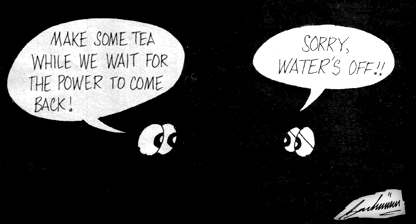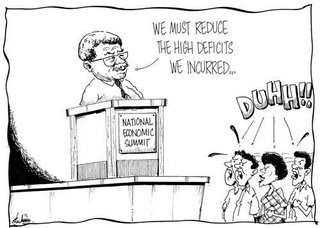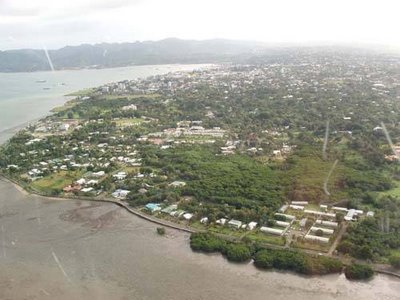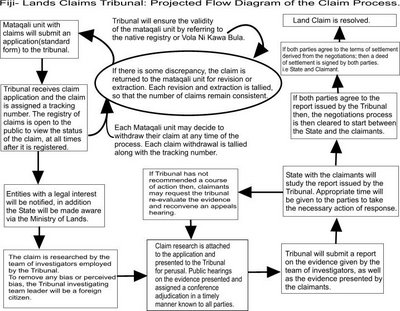Australian newspaper article on the Commander Frank's verbal "dressing-down" of Fiji P.M, has used overly hyped words, such as "attack".
This is the excerpt of the Fiji Sun article.
Lies,lies,lies
Commander: I say Qarase lied from the beginning
By CHEERIANN WILSON
Prime Minister Laisenia Qarase is a liar. That'’s the latest salvo fired by Commodore Voreqe Bainimarama in his war of words with the Government.
In his first public statement since his return from the Middle East the commander of the Republic of Fiji Military Forces accused Mr Qarase of lying to the people of Fiji.
“I say Qarase lied from the beginning when he was elected PM and did the opposite of what was expected of a PM in laughing at the rule of law by releasing coup perpetrators and coming up with racist policies that have divided this country more then ever, [Bainimarama] said.
He has never educated our people in the villages about the wrongs of 2000 which have resulted in the ever present coup mentality.
Cdre Bainimarama said the military no longer had fence sitters to provide liars with support and at any rate the events of 2000 had yet to concluded.
Qarase lied when he told the nation that he did not know the true agenda of the meeting to which he invited me at the Fijian Holdings Boardroom in 2000 after the Tui Vuda was nominated President, said Cdre Bainimarama.
Qarase lied when he and the present chairman of the Great Council of Chiefs conspired to dilute the President'’s nomination of his Vice President after Ratu Jope was removed.The intent to change the nomination after it had been received by the chairman of the GCC is, I believe, unconstitutional. He said the indigenous community had been fed with lies in the form of the controversial Bills.
“Mr Qarase has been on record to say that Fijians have been waiting for these Bills for donkey’s years when we all know that only a handful of people will gain from these,he said.
Let me say that corruption is about lies and in the indigenous context the greatest lie is when it is told by a PM, a talatala or a chief for personal gain for the simple reason that these are the three entities that we hold dear and look up to for advice. This was seen in 2000 in parliament when people in positions of leadership in our society lied to the people of this nation that George Speight was correct in all senses of the word when we knew that these were losers and opportunists jostling for positions and money.
We in the RFMF represent the silent majority of this land and say we are tried of being lied to. Stop now or our children and grandchildren will suffer.”Attempts to obtain comment from Prime Minister Laisenia Qarase yesterday were unsuccessful.
The subtle choice of words to describe the exchange of ideals has many dimension and purposes to them. Timing is everything as someone once noted. Certainly the timing for these editorials barrages from the Australian media is no mistake. The similar editorial 'black-balling' has also been used by the New Zealand media.
A.N.Z's overreaction to Fiji's politics has caused the market speculators to lower Fiji's credit rating yet again.
The Guardian article titled: "Australia Fishing in Fiji's Troubled Seas" was far superior, to the writings extracted from other Dailies from Down Under.
Dramatics by the Army Commander of Fiji has sent negative shock waves through Canberra and Wellington. For one thing, his actions only reveal that their idea of democracy in post-coup ravaged locations, have virtually no clothes. Australia and New Zealand's attempts to cling to the moral high grounds in darkness, reveals in dawn that, their actual tenuous position is pivoting high above the rocks of blind suasion.
Whether Fiji should turn to the declarations of the past, or to the professions of the present; the conduct of these Trans-Tasman nations by their vocal sound bites and media frenzied condemnations of the Fiji Army Commander are equally hideous and distasteful.
If S.I.F.M has the ability, it would clasp both of the condemming nation's ear and apply a twisting motion of harsh magnitude.
S.i.F.M would pour out a fiery stream of biting ridicule, blasting reproach, withering sarcasm, and stern rebuke. In the same process unravel, outline and define the hypocrsiy of Australia and New Zealand.
Australia is the same country that disgraced a nation of Aborigines. Australia is the same country who, was more bombastic to sign up with the Bush coalition's ill-defined invasion of Iraq; Australia is the same country that, is so fraud laden and riddled with deceit that it impels them to steal the oil belonging to East Timor; Australia is the same country which, is plagued with impropriety, impiety, and hypocrisy that; their Politicians attempt to spread such a similar veil of immoral turpitude in Fiji.
Club Em Designs



























